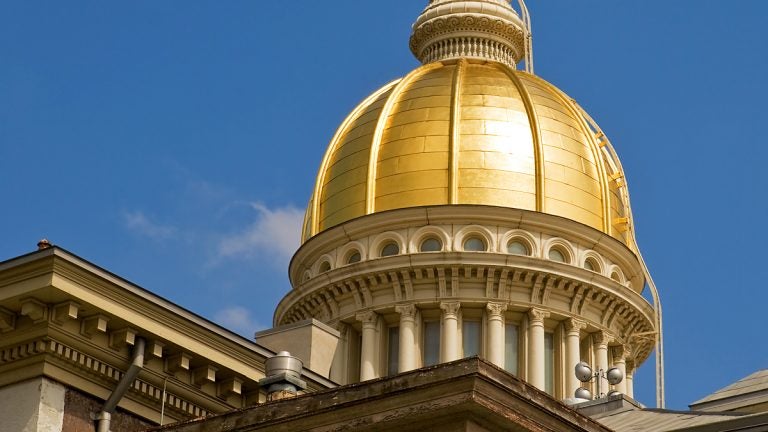N.J. Senate approves bill that could bring more charter schools to Camden

N.J. State Capitol dome in Trenton
New Jersey state Senate Democrats yesterday backed Gov. Chris Christie’s revisions to a controversial bill to extend the Urban Hope Act in Camden, moving the legislation a step closer to law without as much as a word of a debate.
In yesterday’s only approval of a conditional veto by the governor, the state Senate passed the revised bill by a 31-1, largely procedural vote. There was no public comment on the floor at all.
The vote moves the new bill to the Assembly, where there is no assurance of easy passage but no signs as yet of resistance, either. The full Assembly meets next week.
The new bill would extend for a year the Urban Hope Act, enacted in 2012, which opened the way for large charter networks to launch a hybrid version of charter schools in selected districts.
Three such organizations have opened their first schools in Camden this fall, the first of as many as 15 new schools slated for the state-run district.
The new legislation would leave the process open for another year to allow more organizations to apply. The bill would also provide more flexibility to the existing networks already in place, letting them use district buildings in addition to newly built schools, which were the original focus of the law.
While Christie approved of the intent of the bill, his conditional veto removed a provision that would have provided some early retirement incentives to Camden public-school teachers who might lose their jobs due to downsizing of the district.
The veto clearly gained the bill some votes yesterday from Republicans – and maybe a couple of Democrats — who didn’t like the early retirement provisions in the original bill.
“As you saw from the recognition of this house, from both sides of the aisle … there was no controversy here,” said state Senate President Steve Sweeney (D-Gloucester) after the vote.
The revised bill was opposed by some local and statewide advocates who oppose charter expansion in the state-run Camden district. Some of those advocates have filed a legal challenge to the approvals. Sweeney yesterday said he heard the criticism, but discounted it.
“I’m open to improve education in Camden, and we’re hoping this is part of the solution,” he said. “We could be wrong, but what we are doing otherwise isn’t working.”
The vote was welcomed by the state’s charter school association, which issued a statement in the late afternoon.
“”The New Jersey Charter Schools Association supports the intent of this legislation to provide more high-quality educational options for families,” read the statement from Carlos Perez, the association’s president. “Regardless of the school’s location, districting, or program, great schools should not be delayed if they provide families great educational options for their children.”
One conspicuous abstention yesterday came from state Sen. Donald Norcross (D-Camden), the original sponsor of the Urban Hope Act.
His brother, Democratic political leader and South Jersey businessman George Norcross, has been one of the chief promoters of the act, and is the namesake of one of the first charter schools to open under the law in Camden.
But state Sen. Norcross, who is running for U.S. Congress in the 1st District, has largely stayed out of the public debate since the act’s initial passage. While he attended the Senate session yesterday, he left before the final vote on the extension.
State Sen. Shirley Turner (D-Mercer) was the sole dissenter yesterday. She said her initial complaints about the bill had not changed, even if her allies had left her.
Turner cited provisions in the Urban Hope Act that allow the charter networks to be paid 95 percent of per-pupil costs for each student, up from the 90 percent for the traditional charters.
“Last time, it was the whole notion of taking money out of (district) public schools,” she said. “This is even worse, as they are taking even more. Where is it going to end?”.
___________________________________________________
NJ Spotlight, an independent online news service on issues critical to New Jersey, makes its in-depth reporting available to NewsWorks.
WHYY is your source for fact-based, in-depth journalism and information. As a nonprofit organization, we rely on financial support from readers like you. Please give today.




